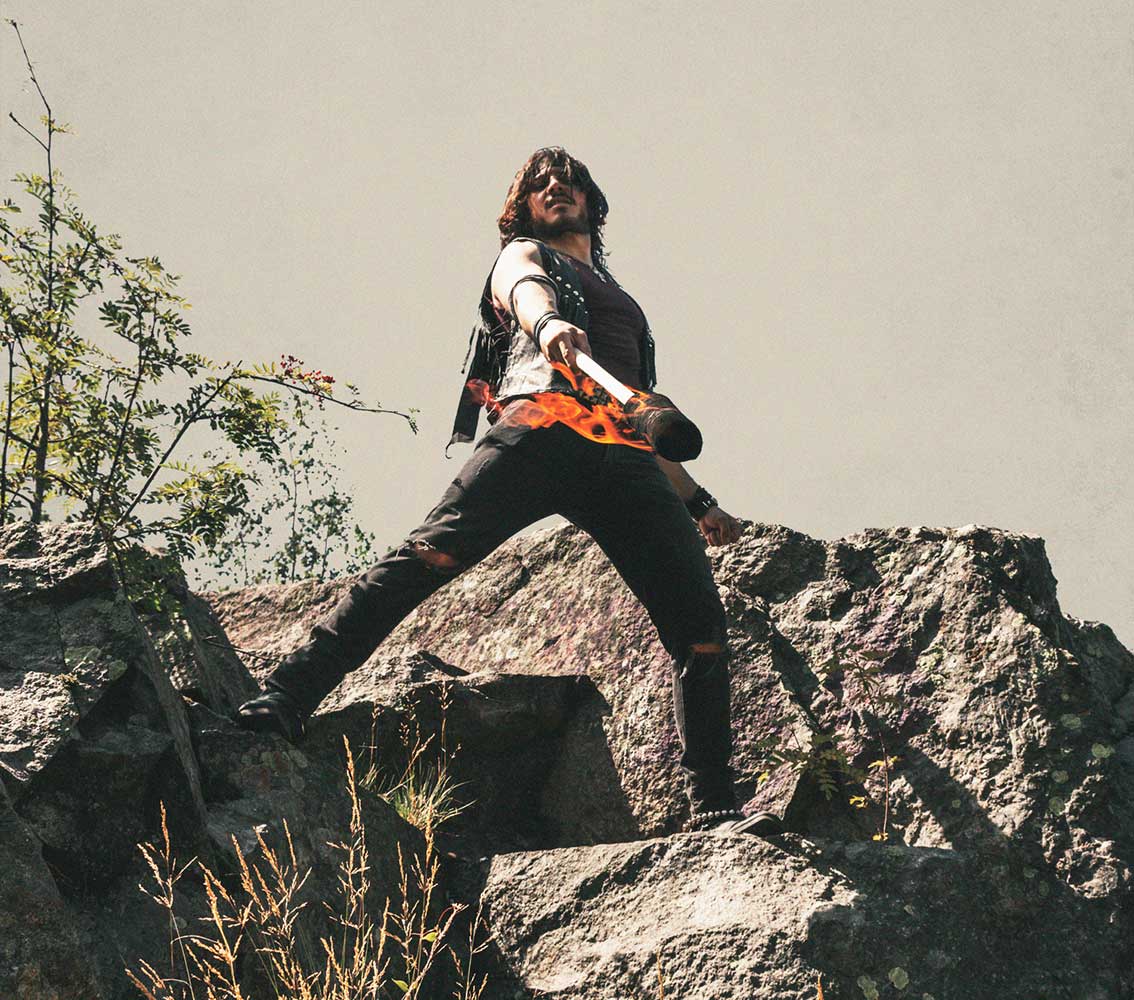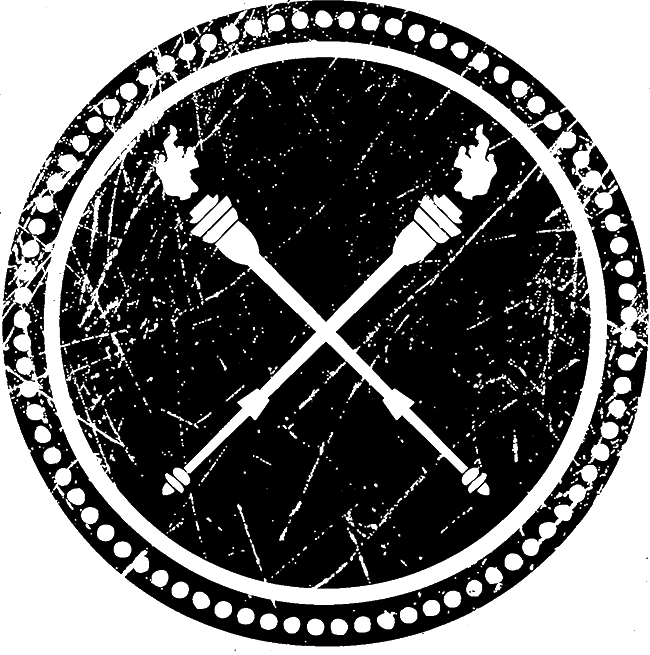Flamekeeper
2020-01-08
by Niklas Göransson
Stirring tunes for firestarters – Flamekeeper is an epic metal passion project based in Stockholm, operated by Italian multi-instrumentalist and spiritual agitator Marco S.
– I want my songs to stand as supporting columns of a temple devoted to strength, free-thinking, honour, and independence. FLAMEKEEPER is an invitation to arrogantly reveal our true selves within a society pushing us to be interchangeable and opaque imitations of sentient human beings. Fire stands as the ultimate metaphor for this spiritual rebellion and, seeing as it’s also the primordial source of light and heat, is a perfect representation of my will to transform FLAMEKEEPER into a gathering force. When it comes to the pairing of words and music, I use a semi-unconscious process to achieve the perfect match thereof. My song-writing technique is heavily based on associations created in-between seemingly unrelated styles of music; for example, Serj Prokofiev, DISSECTION, DEAD CAN DANCE, BROCAS HELM, and NECROMANTIA can all co-exist as inspirational sources, even in the scope of a four-minute track.

FLAMEKEEPER’s recent mini-album “We Who Light the Fire”, released by Invictus Productions in November 2019, includes a cover of NECROMANTIA’s classic masterpiece “Ancient Pride – although not originally intended as one, it ultimately became an appropriate homage to the recently deceased Baron Blood. MANILLA ROAD is another band coming to mind, especially in the merging of ambitious concepts and epic music.
– MANILLA ROAD are undoubtedly one of my biggest influences, with one of the main reasons being Mark Shelton‘s human and humble approach to epic heavy metal. I tend to focus on the grand scheme of things when it comes to music so it’s kinda hard for me to categorise FLAMEKEEPER. Also, I like providing listeners a blank canvas so they can paint the picture themselves. Had I been born a writer, “We Who Light the Fire” would’ve been a book, if I was born a director it would’ve been a movie. Instead, I’m a musician – and a metalhead – so it just happened to materialise as a record. Music is the only medium through which I know how to communicate with the rest of the world. Regardless of its final form, I know I was meant to develop these ideas, here and now, in this present day and age.
“We Who Light the Fire” also features a visual representation tying into the thematic content – besides the cover artwork, there are also two rather elaborate custom-drawn sigils.
– The ’Order of the Torch’ sigil, which I created myself, depicts two torches crossed over a shield and serves as an invitation to help ’defend the flame’. Fire symbolises the entire life-code and mindset supporting FLAMEKEEPER, so this is a call to protect its spark. The other sigil, ’Wisdom of Fire’, bears a meaning as deep as the one ingrained within the runes incorporated in it. I never intended for FLAMEKEEPER to borrow parts of its identity from any particular folklore but was forced to make an exception: whilst working on the graphic rendition of the ’FK’ acronym and considering different typographical options, I was advised to look into the runic alphabet. The combination of the runes Ansuz – which stands for knowledge and wisdom – with Kenaz, fire and inner light, resulted in an incredibly powerful visual and conceptual embodiment of FLAMEKEEPER‘s philosophical purpose. Wisdom and inner strength are essential skills in the quest for the unveiling of our true selves.
There’s also a certain sense of solemnity in both aesthetics and photographic depictions, which can be difficult to achieve in the context of heroic heavy metal. Shots such as the one of Marco wielding a torch, for example, easily end up looking either cringy or farcical.
– I’ve never been more serious in my life than I am with FLAMEKEEPER, so I’m glad it’s perceived that way. I had a pretty simple idea for the photo-shoot and, for the first time after an entire decade of playing black metal, I just wanted to be me: no face-paint, no spikes, and no pseudonym. For once, I didn’t want to disappear behind the ’metal musician’ image. Don’t get me wrong, I’m not criticising traditional metal appearance and I don’t want this music to become gentrified, but I think many musicians should put more efforts into displaying personality. All our greatest metal idols are – or, sadly, more often nowadays, were – just themselves, no matter how simple or extravagant their persona. It took me years to understand that the charisma permeating the photos of old legends doesn’t lie in the smaller details copied by all the newer bands.

Your lyrics, I’m assuming they are oriented more towards mortal heroics than any form of fantasy or myth?
– FLAMEKEEPER is not about any conventional epic themes like Viking heritage or Hellenic mythology, it’s not even about me – it’s about all of us. That’s why the EP songs often refer to a collective. ‘WE are the nomads of the world beyond’, ‘WE who light the fire’, etcetera. These lyrics are supported by catchy choruses easy to sing along to. There might be some references here and there, as I explained regarding the runic sigil, but to think that what I sing about belongs to fantasy topics would be a huge mistake. I’m not trying to revive any historical period of the past; I focus on the now, on living the present moment to the fullest. If FLAMEKEEPER was a book, it would be far closer to Fight Club than Lord of the Rings.
Fight Club is a 1996 novel written by American author Chuck Palahniuk. The book, which spawned the 1999 cult film by the same name, tells the story of an automobile recall specialist who struggles to find meaning within the confines of modern society. Unmoved by material wealth, he combats his insomnia by attending different support groups for various kinds of nasty afflictions. After returning home from a business trip, the unnamed protagonist finds his entire apartment, along with all of his earthly possessions, blown to smithereens by what appears to be a gas leak.
– FLAMEKEEPER‘s goal is to disrupt narratives of who we are as individuals, this narrow sense of self plaguing our lives. The mission is, in short, to reveal your true self and set the world on fire. I can certainly see this definition fitting Fight Club‘s nameless narrator, whose true nature has been watered down by contemporary materialistic society in favour of behaviour easier to control. Everything in his surroundings is expendable, including human relationships. He’s so far from having a real understanding of himself that he must attend group therapy sessions in order to feel genuine emotions. Once he seemingly ’loses everything’, his belief system inevitably collapses and his true power is finally unveiled. Paradoxically, he discovers his ego as all individuality disappears in this clandestine collective he’s created out of desperate attempts to feel alive. The ‘fight clubs’ are an underground bond, invisible to the eye of a conformist society, able to fill an otherwise incurable feeling of emptiness and existential alienation. This concept was heavily influential on the song “Nomads of the World Beyond”, which invites listeners to become ghosts in the civilised world; to disobey its rules and form a rebellious kinship.
Is this a quest to bring about actual change in the macrocosm, or more of a battle contested within?
– Making any kind of difference in the material world is not a feasible endeavour. On the other hand, even if my personal struggles led to the creation of FLAMEKEEPER I wouldn’t say they’ve been relevant to the universal message I want to convey. As a person, I tend to burn the candle from both ends so I often feel overwhelmed and in need of motivation – I regain exactly this by listening to “We Who Light the Fire”, which has a message as relatable to me as it is to anyone else.

Besides FLAMEKEEPER, Marco also plays in a black metal band called DEMONOMANCY. After reading the lyrics for their 2018 album, “Poisoned Atonement”, I’m wondering if there’s any ideological common ground between the two projects.
– Both are depositions of my inward exploration. Some of the “Poisoned Atonement” lyrics, which were co-written with the band’s drummer, are inspired by my passion for biblical atmospheres, found also in FLAMEKEEPER‘s “Dead Sea Waters”. Other songs deal with my obsession and struggle with psychology, including themes such as Jungian archetypes, obsessive-compulsive disorder, and my narcissistic or nihilistic rage which has obliterated a plethora of relationships and friendships. The thing is, I’m self-authoritarian. My demand for nothing short of excellence easily spills over into obsession. In the past, the limitation of being human and unable to achieve the level of perfection I expected both from myself and others caused me intense rage, latent depression, as well as a general sense of disenchantment, nihilism, and apathy towards life. My inability to see any shades of grey in-between the black and white made me part ways with others so violently and drastically that, at one point, I had to completely rebuild my life’s foundations from scratch. It’s wasn’t about being right or wrong, I just lacked the spirit of self-preservation.
He adds how the lyrics for DEMONOMANCY‘s “Fiery Herald Unbound (The Victorious Predator)” testify to the continuity in-between the two projects, in that they were his first attempt at writing about the spiritual and philosophical renaissance heralded in FLAMEKEEPER.
– When the main question in my head went from ’What is there for me in this world?’ to ’Who am I in this world?’, the shift to the “Poisoned Atonement” sound happened. Lyrics and music became my deepest source of introspection and a way to explore hidden aspects of my identity; this is what that album was about, hence all the lyrical themes about the subconscious. Once this process was over, I focused on how I function and interact with the world around me but, more importantly, started questioning the legitimacy of concepts such as ’me’. The next question I asked myself, the one that made me found FLAMEKEEPER, was, ’Now that I know who I am, what is my role within this world?’
Marco adds that polarities such as ‘friends and enemies’, ‘work and freedom’, ‘society and hermitage’, ‘city and nature’ were overwhelming notions for his teenage self of eleven years ago, who spent more time trying to come to grips with himself.
– I was fifteen years old when I co-founded DEMONOMANCY; I just knew I wanted to write and perform music in a band. The other two former members and I listened to Nuclear War Now! titles pretty much twenty-four-seven so I’d say that what we played back then came from the need to find our place in the world we loved. Now I am perfectly conscious that without this complex web of opposites constituting our lives, there would be no such thing as the ’self’’. We are merely the product of our surroundings and much of our existence is spent either fighting or accepting this notion. With FLAMEKEEPER, I sing about the opportunity to put choice over chance and achieve what we thrive for in the company of our peers. Age has taught me that we can’t achieve anything truly significant without help from others. We are constantly pushed to align our personalities with the more convenient aspects of society – so, if there is a true ’self’ we keep it buried in our minds, overwhelmed by the fear of being judged or isolated. Consequently, while “Poisoned Atonement” seeks to define the individual through self-analysis and explorations of the unconscious, FLAMEKEEPER is the result of understanding that we cannot ultimately know who we are without interacting with the collective known as the external world.
Would you say FLAMEKEEPER is a personal means to propel yourself into these positive changes described in the lyrics?
– Every form of art is born from the sublimation of its creator’s torment and as compensation for his inability to express personal thoughts through canonical verbal communication. If it’s true that creating art is selfishly liberating, that’s surely what I’ve done with DEMONOMANCY. Black metal can be defined as ‘egosyntonic’, which means that, as a musical genre, it almost never questions the listener’s view of reality but instead reinforces it. In younger years I felt attracted to, but also overwhelmed by, the destructive power of black metal; today though, my attention falls more on themes like strength, honour, and loyalty. I now desire to create a connection with the external world, singing about themes familiar to all of us. I have no interest in making people listen to the pain of being me, I prefer channelling that struggle into creating an artistic effort capable of empowering both myself and others. If I’m lost in a desert, I don’t want to listen to someone lamenting the unfairness of the world – I need music which reminds me to bear up, dig deep, and move on since no one will find shade or water in my place.



